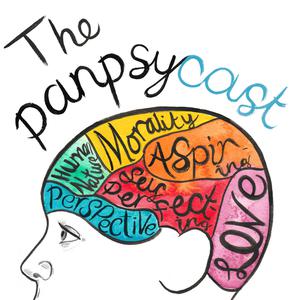
The Panpsycast Philosophy Podcast
Jack Symes | Andrew Horton, Oliver Marley, and Rose de Castellane
- 56 minutes 11 secondsEpisode 138, Plato's Symposium (Part I - The Hangover)
A Christmas party is where humanity’s deepest truths can be revealed. It’s a space where profound questions like "How much gravy is too much gravy?" “What is partridge doing in a pear tree?” mingle seamlessly with "What is the meaning of life?" The very act of gathering to celebrate is a tribute to our existential longing for connection, love, joy, and embarrassing drunken dance moves. Plato might have envisioned it as a quest for wisdom, but let’s be honest, sometimes the real enlightenment happens while debating who gets the last Brussels sprout.
Today, we're stepping into one of the most intriguing parties in philosophy — Plato’s Symposium. A gathering of Ancient Athens’ most brilliant minds, lounging on couches, wine flowing freely, engaging in an intense yet playful exchange about the nature of love. But make no mistake, this is no ordinary party. Hosted at the home of the tragic playwright Agathon, this gathering is filled with laughter, drama and impassioned speeches. A celebration of intellect and pleasure, a blend of wit, wisdom, and revelry. As the night goes on, the conversation turns from the playful to the profound. What insights do our guests discover? What, indeed, is love? So, grab a seat at the table—because in Plato’s Symposium, the ideas are nearly as intoxicating … as the wine.
Note
Please note that two of our microphones experienced technical difficulties. We appreciate your understanding and assure you that our usual high-quality audio will resume in the next episode.
Links
Plato, The Symposium (pdf)
Thomas Cooksey, Plato’s Symposium: A Reader’s Guide (book)
Gregory D. Sadler, Plato’s Symposium (YouTube lectures)
Allan Bloom and Seth Benardete, Commentaries on Plato’s Symposium (book)
Pierre Destrée and Zina Giannopoulou, Plato's Symposium A Critical Guide (book)
29 December 2024, 6:00 am - 38 minutes 47 secondsEpisode 137, Between God and Atheism: Live in London (Part II - Further Analysis and Discussion)
This is a live recording from our recent show at The Royal Institution Theatre in London.
The panel includes returning guests Philip Goff (professor of philosophy at Durham) and Rowan Williams (former Archbishop of Canterbury), as well as two new panellists, Elizabeth Oldfield (the popular writer) and Alex O’Connor (the popular YouTuber).
It’s a very warm and good-spirited debate exploring the problems with traditional religion and atheism. The main arguments discussed are the argument for God from design and the argument against God from evil. Veteran listeners will be familiar with these arguments; still, in each case, it’s fascinating to hear the responses from both sides of the aisle on what their opponents take to be the strongest objections to their view.
Without further ado, here’s the audio from our live show…we hope you enjoy the conversation.
15 December 2024, 6:00 am - 48 minutes 1 secondEpisode 137, Between God and Atheism: Live in London (Part I - The Debate)
This is a live recording from our recent show at The Royal Institution Theatre in London.
The panel includes returning guests Philip Goff (professor of philosophy at Durham) and Rowan Williams (former Archbishop of Canterbury), as well as two new panellists, Elizabeth Oldfield (the popular writer) and Alex O’Connor (the popular YouTuber).
It’s a very warm and good-spirited debate exploring the problems with traditional religion and atheism. The main arguments discussed are the argument for God from design and the argument against God from evil. Veteran listeners will be familiar with these arguments; still, in each case, it’s fascinating to hear the responses from both sides of the aisle on what their opponents take to be the strongest objections to their view.
Without further ado, here’s the audio from our live show…we hope you enjoy the conversation.
1 December 2024, 6:00 am - 32 minutes 41 secondsEpisode 136, ‘A World Unmade’ with Peter Hitchens (Part II - A Revolution Betrayed)
The Western world faces a tidal wave of secularisation, which shows no signs of receding. In the UK, Christian self-identification has plummeted – dropping, for example, from 72% in 2001 to 47% in 2021. The secularists argue that this trend reflects a shift towards an inclusive and intellectually progressive society; their critics, however, warn that the decline of faith erodes our moral foundations and frays our social ties. “The secular flood isn’t just about church attendance,” they say, “but strikes at the heart of our nation’s identity and stability.”
For many conservatives, nowhere is this betrayal of our values more evident than our education system. In the UK, the 1944 Education Act introduced free secondary education to all children for the first time – with grammar schools said to offer exceptional educations to our most talented students. Today, grammar schools are in decline, and the founding of new ones prohibited. It was argued that these schools favoured the middle classes and perpetuated social divisions; others, however, believe that closing these pathways has reduced educational and social opportunities. Like the Christian identity of the nation, grammar schools are at risk of being confined to history books.
In this episode, we’ll be speaking with Peter Hitchens – British journalist, author, and social critic – about what religious and educational changes mean for the soul of Britain. Together, we’ll explore whether this shift marks the dawn of a more inclusive era – or the washing away of a once Great Britain.
Links
Peter Hitchens, Mail Online: Blog
17 November 2024, 6:00 am - 37 minutes 26 secondsEpisode 136, ‘A World Unmade’ with Peter Hitchens (Part I - The Rage Against God)
The Western world faces a tidal wave of secularisation, which shows no signs of receding. In the UK, Christian self-identification has plummeted – dropping, for example, from 72% in 2001 to 47% in 2021. The secularists argue that this trend reflects a shift towards an inclusive and intellectually progressive society; their critics, however, warn that the decline of faith erodes our moral foundations and frays our social ties. “The secular flood isn’t just about church attendance,” they say, “but strikes at the heart of our nation’s identity and stability.”
For many conservatives, nowhere is this betrayal of our values more evident than our education system. In the UK, the 1944 Education Act introduced free secondary education to all children for the first time – with grammar schools said to offer exceptional educations to our most talented students. Today, grammar schools are in decline, and the founding of new ones prohibited. It was argued that these schools favoured the middle classes and perpetuated social divisions; others, however, believe that closing these pathways has reduced educational and social opportunities. Like the Christian identity of the nation, grammar schools are at risk of being confined to history books.
In this episode, we’ll be speaking with Peter Hitchens – British journalist, author, and social critic – about what religious and educational changes mean for the soul of Britain. Together, we’ll explore whether this shift marks the dawn of a more inclusive era – or the washing away of a once Great Britain.
Links
Peter Hitchens, Mail Online: Blog
3 November 2024, 5:00 am - 30 minutes 16 secondsEpisode 135, ‘The Philosophy of Headphones’ with Jacob Kingsbury Downs (Part II - Further Analysis and Discussion)
Listening to a podcast on the morning commute, drowning out the office noise with your favourite album, getting lost in an audiobook as you walk home – for many of us, navigating the world through headphones is second nature. But is there more to these everyday experiences than listening to our favourite content? Is there more to headphone listening than meets our ears?
In this episode, we’ll be exploring the philosophy and psychology of sound and headphone listening with Dr Jacob Kingsbury Downs, Departmental Lecturer in Music at the University of Oxford. Named as one of 2024’s BBC New Generation Thinkers, Jacob’s research takes place at the intersection between sound studies and continental philosophy, and seeks to reveal how headphone use shapes our minds and the fabric of society.
According to Downs, headphones do more than play our favourite sounds. They transport us into sensory shelters – intimate spaces of comfort and focus – and our own private theatres. Headphone listening, he argues, is about safety, control, and reconnecting with feelings of home. Yet, not all sounds are soothing; as we shall see, sometimes our intimate sonic spaces can be exploited as a means of torture, brainwashing, and corrupting our sense of self.
Don’t worry, though; you’re safe with us. Plug in your headphones; it’s time to relax. After all, there’s no place like home.
The file size is large, please be patient whilst the podcast buffers/downloads/warms up your headphonesLinks
20 October 2024, 5:00 am - 39 minutes 47 secondsEpisode 135, ‘The Philosophy of Headphones’ with Jacob Kingsbury Downs (Part I - There’s No Sound Like Home)
Listening to a podcast on the morning commute, drowning out the office noise with your favourite album, getting lost in an audiobook as you walk home – for many of us, navigating the world through headphones is second nature. But is there more to these everyday experiences than listening to our favourite content? Is there more to headphone listening than meets our ears?
In this episode, we’ll be exploring the philosophy and psychology of sound and headphone listening with Dr Jacob Kingsbury Downs, Departmental Lecturer in Music at the University of Oxford. Named as one of 2024’s BBC New Generation Thinkers, Jacob’s research takes place at the intersection between sound studies and continental philosophy, and seeks to reveal how headphone use shapes our minds and the fabric of society.
According to Downs, headphones do more than play our favourite sounds. They transport us into sensory shelters – intimate spaces of comfort and focus – and our own private theatres. Headphone listening, he argues, is about safety, control, and reconnecting with feelings of home. Yet, not all sounds are soothing; as we shall see, sometimes our intimate sonic spaces can be exploited as a means of torture, brainwashing, and corrupting our sense of self.
Don’t worry, though; you’re safe with us. Plug in your headphones; it’s time to relax. After all, there’s no place like home.
The file size is large, please be patient whilst the podcast buffers/downloads/warms up your headphonesLinks
6 October 2024, 5:00 am - 40 minutes 27 secondsEpisode 134, The Philosophy of War (Part III - Further Analysis and Discussion)
On August 6, 1945, an atomic bomb was dropped on Hiroshima, instantly killing up to 80,000 civilians, with another 40,000 dying soon after from burns and radiation poisoning. The bombings of Hiroshima and Nagasaki led to the surrender of the Japanese Army, marking the end of the most destructive war in history.
War has been a constant throughout history. Since the dawn of agriculture, humans have waged war against one another. Some argue that war is ingrained in human nature, from our ancestors battling over resources and empires seeking expansion, to biblical genocides and acts of human sacrifice—Homo sapiens are seemingly insatiable for conflict. Others, however, believe war is not inevitable and that we have the capacity for humility, justice, and kindness without resorting to armed conflict.
We must remember that explaining war is not the same as justifying it. While pacifism, as exemplified by Jesus and Gandhi, is often seen as noble, is non-violence truly effective against regimes intent on ethnic cleansing? If not, how do we determine when war is justified and what defines proportional force? Can the killing of innocent civilians ever be justified? And, if not, how do they differ from innocent combatants? War, huh, good god, what is it good for?
Links
A.C. Grayling, War: An Enquiry (book)
Richard Overy, Why War? (book)
Jeff Mcmahan, Killing in War (book)
Michael Walzer, Just and Unjust Wars (book)
22 September 2024, 5:00 am - 43 minutes 42 secondsEpisode 134, The Philosophy of War (Part II - In Pursuit of Power)
On August 6, 1945, an atomic bomb was dropped on Hiroshima, instantly killing up to 80,000 civilians, with another 40,000 dying soon after from burns and radiation poisoning. The bombings of Hiroshima and Nagasaki led to the surrender of the Japanese Army, marking the end of the most destructive war in history.
War has been a constant throughout history. Since the dawn of agriculture, humans have waged war against one another. Some argue that war is ingrained in human nature, from our ancestors battling over resources and empires seeking expansion, to biblical genocides and acts of human sacrifice—Homo sapiens are seemingly insatiable for conflict. Others, however, believe war is not inevitable and that we have the capacity for humility, justice, and kindness without resorting to armed conflict.
We must remember that explaining war is not the same as justifying it. While pacifism, as exemplified by Jesus and Gandhi, is often seen as noble, is non-violence truly effective against regimes intent on ethnic cleansing? If not, how do we determine when war is justified and what defines proportional force? Can the killing of innocent civilians ever be justified? And, if not, how do they differ from innocent combatants? War, huh, good god, what is it good for?
Links
A.C. Grayling, War: An Enquiry (book)
Richard Overy, Why War? (book)
Jeff Mcmahan, Killing in War (book)
Michael Walzer, Just and Unjust Wars (book)
8 September 2024, 5:00 am - 42 minutes 38 secondsEpisode 134, The Philosophy of War (Part I - The Human Condition)
On August 6, 1945, an atomic bomb was dropped on Hiroshima, instantly killing up to 80,000 civilians, with another 40,000 dying soon after from burns and radiation poisoning. The bombings of Hiroshima and Nagasaki led to the surrender of the Japanese Army, marking the end of the most destructive war in history.
War has been a constant throughout history. Since the dawn of agriculture, humans have waged war against one another. Some argue that war is ingrained in human nature, from our ancestors battling over resources and empires seeking expansion, to biblical genocides and acts of human sacrifice—Homo sapiens are seemingly insatiable for conflict. Others, however, believe war is not inevitable and that we have the capacity for humility, justice, and kindness without resorting to armed conflict.
We must remember that explaining war is not the same as justifying it. While pacifism, as exemplified by Jesus and Gandhi, is often seen as noble, is non-violence truly effective against regimes intent on ethnic cleansing? If not, how do we determine when war is justified and what defines proportional force? Can the killing of innocent civilians ever be justified? And, if not, how do they differ from innocent combatants? War, huh, good god, what is it good for?
Links
A.C. Grayling, War: An Enquiry (book)
Richard Overy, Why War? (book)
Jeff Mcmahan, Killing in War (book)
Michael Walzer, Just and Unjust Wars (book)
25 August 2024, 5:00 am - 47 minutes 35 secondsEpisode 133, 'Vulture Capitalism' with Grace Blakeley: Live at Glastonbury Festival
They say money can’t buy happiness, but it can buy power, freedom, and security. The one per cent – who control nearly half of the world’s wealth – understand this better than anyone. In capitalist democracies, corporations spend billions on political donations and lobbying to influence economic policies in line with their own interests. The trillions spent by governments in propping up the banks following the 2008 financial crash – and the bailing out of the largest corporations through the Covid Corporate Financing Facility – speak volumes: the state and the economy are not separate entities. The goal of the state is clear: “Steady the ship and maintain course.”
Corporations don’t just pose a threat to our economic freedoms, but the future of the natural world. Just a handful of firms are responsible for over seventy per cent of carbon emissions, and despite public pressure, corporate action on the climate crisis has been largely ineffective. We shouldn’t be surprised; after all, industry holds the power, and turkeys don’t vote for Christmas.
Links
Grace Blakeley, Vulture Capitalism: Corporate Crimes, Backdoor Bailouts and the Death of Freedom
11 August 2024, 5:00 am - More Episodes? Get the App
Your feedback is valuable to us. Should you encounter any bugs, glitches, lack of functionality or other problems, please email us on [email protected] or join Moon.FM Telegram Group where you can talk directly to the dev team who are happy to answer any queries.
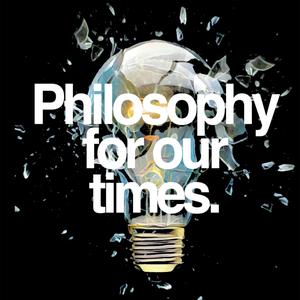 Philosophy For Our Times
Philosophy For Our Times
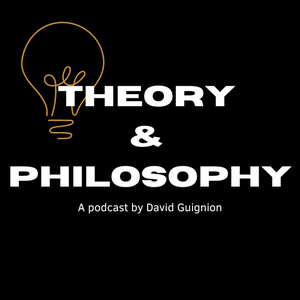 Theory & Philosophy
Theory & Philosophy
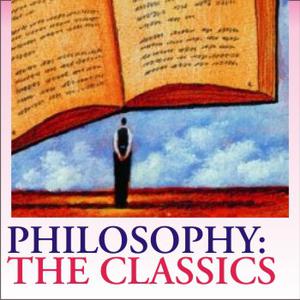 Philosophy: The Classics
Philosophy: The Classics
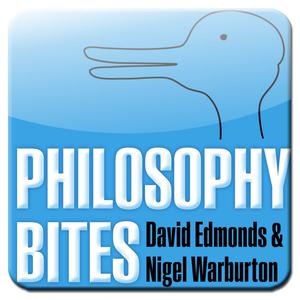 Philosophy Bites
Philosophy Bites
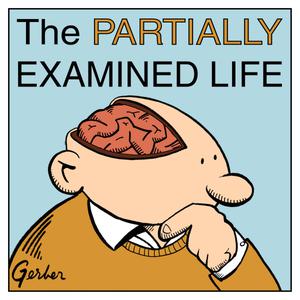 The Partially Examined Life Philosophy Podcast
The Partially Examined Life Philosophy Podcast
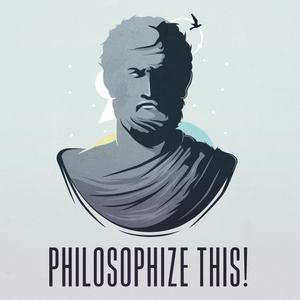 Philosophize This!
Philosophize This!